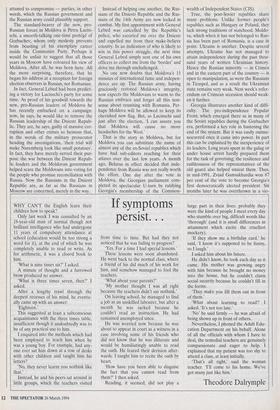If symptoms
persist. . .
WHY CAN'T the English learn their children how to speak?
Only last week I was consulted by an 18-year-old man of normal though not brilliant intelligence who had undergone 11 years of compulsory attendance at school (education would be too strong a word for it), at the end of which he was completely unable to read or write. As for arithmetic, it was a closed book to him.
'What is nine times six?' I asked.
A minute of thought and a furrowed brow produced no answer.
'What is three times seven, then?' I asked.
After a lengthy trawl through the deepest recesses of his mind, he eventu- ally came up with an answer: 'Eighteen.'
This suggested at least a subconscious acquaintance with the three times table, insufficient though it undoubtedly was to be of any practical use to him.
I enquired into the methods which had been employed to teach him when he was a young boy. For example, had any- one ever sat him down at a row of desks with other children and taught him his letters?
'No, they never learnt you nothink like that.'
Instead, he and his peers sat around in little groups, which the teachers visited from time to time. But had they not noticed that he was failing to progress?
'Yes. For a time I had special lessons.'
These lessons were soon abandoned. He went back to the normal class, where a friend of his did much of his work for him, and somehow managed to fool the teachers.
'What about your parents?'
'My mother thought I was all right because the teachers didn't say nothink.'
On leaving school, he managed to find a job as an unskilled labourer, but after a month he was sacked because he couldn't read an instruction. He had remained unemployed since.
He was worried now because he was about to appear in court as a witness in a case involving some of his friends who did not know that he was illiterate and would be humiliatingly unable to read the oath. He feared their derision after- wards: I taught him to recite the oath by heart.
'How have you been able to disguise the fact that you cannot read from them?' I then asked.
Reading, it seemed, did not play a large part in their lives: probably they were the kind of people I meet every day who stumble over big, difficult words like 'thorough' (and it is small differences in attainment which excite the cruellest mockery).
'If they show me a birthday card,' he said, 'I know it's supposed to be funny, so I laugh.'
I asked him about his future.
He didn't know, he took each day as it came. His mother was growing angry with him because he brought no money into the house, but he couldn't claim social security because he couldn't fill in the forms.
'They make you fill them out in front of them.'
'What about learning to read?' I asked. 'It's not too late.'
'No' he said firmly — he was afraid of being shown up in front of others.
Nevertheless, I phoned the Adult Edu- cation Department on his behalf. Alone of all the officials with whom I have to deal, the remedial teachers are genuinely compassionate and eager to help. I explained that my patient was too shy to attend a class, at least initially.
'That's all right,' said the woman teacher. 'I'll come to his home. We've got many just like him.'
Theodore Dalrymple


























































 Previous page
Previous page